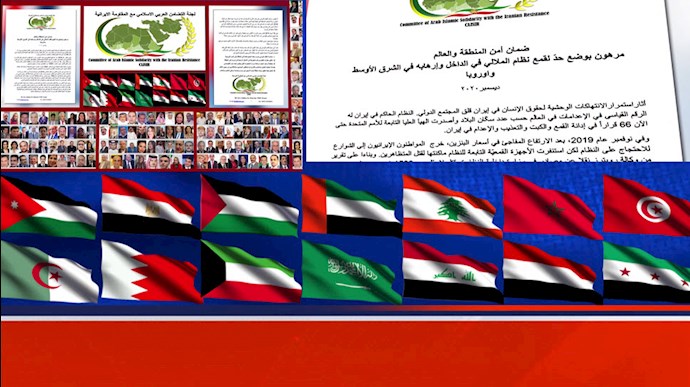Prominent Arab political and legal figures: To ensure the security of the region and the world, The Iranian regime’s terrorism in the region and Europe must end
The suppression and continuation of human rights violations in Iran must end
124 prominent Arab political and legal figures, including the Yemeni Minister of Human Rights and nine former ministers, 18 parliamentarians, 21 former parliamentarians, as well as legal figures from 15 Arab countries, issued a statement condemning the continuing human rights abuses. They stressed the issue of terrorism, as evidenced by the trial of the regime’s terrorist diplomat and three accomplices in Belgium.
These figures underlined in their statement that the suppression of the November Uprising was a clear example of a crime against humanity and the continuation of large-scale massacres, including the massacre of 30,000 supporters of the Mujahedin-e Khalq (MEK) and militant political prisoners in 1988.
They underlined that the Iranian regime’s terrorism is not limited to the Middle East.
Four people, including a diplomat serving in the Iranian regime, are currently on trial in Belgium for a terrorist plot against the Free Iran gathering.
The signatories of this statement underlined “in the Arab countries neighboring Iran, we are witnessing destructive interventions and the export of terrorism by the regime. The result has been the killing of hundreds of thousands of people and the displacement of millions”
Finally they “call on the Secretary-General and the UN High Commissioner for Human Rights, European leaders, and the international community to hold the Iranian regime accountable for its rampant terrorism, especially in the region and in European countries.”
The statement by Arab figures from Jordan, Egypt, Palestine, the United Arab Emirates, Lebanon, Morocco, Tunisia, Algeria, Bahrain, Kuwait, Saudi Arabia, Iraq, Yemen, and Syria is as follows :
The continuing brutal human rights abuses in Iran have alarmed the international community. The ruling regime in Iran holds the world record for executions relative to population. UN agencies have so far condemned Iran in (67) resolutions for repression, torture, and executions.
In November 2019, following a sudden rise in gasoline prices, Iranians took to the streets to protest. But regime organizations mobilized their repression machine to kill the demonstrators. Within days, at least 1,500 people were killed and nearly 12,000 were arrested, imprisoned, and tortured.
On September 2, 2020, Amnesty International published a report entitled “Trampled Humanity” in which it described the various forms of torture used by the regime in prisons against detained demonstrators and political prisoners.
What happened in November 2019 was a clear example of a crime against humanity and the continuation of large-scale killings, including the massacre of 30,000 political prisoners in 1988, only because they reiterated their stance in defense of freedom. In 2018, Amnesty International released a detailed report documenting the massacre by the mullahs’ regime, calling it a continuing crime against humanity whose perpetrators and perpetrators must be brought to justice by the United Nations and the international community.
As the flip side of repression inside Iran, we are witnessing destructive interventions and the export of unbridled terrorism of this regime in the region and neighboring Arab countries. Including Iraq, Syria, Lebanon, Yemen, and Bahrain, which resulted in the killing of hundreds of thousands of people and the displacement of millions more in these countries.
We condemn these destructive policies of the Iranian regime in the Middle East, including its support for terrorist proxy groups and its ballistic missile program, and consider this behavior of the Iranian regime against peace and stability in the region and the world.
The Iranian regime’s terrorism is not limited to the Middle East. And has spread to Europe.
Four people, including a diplomat serving in the Iranian regime, are currently on trial in Belgium for a terrorist plot against the Free Iran gathering on June 30, 2018. Many of us participated in this program.
Among the four defendants is Assadollah Asadi, the official diplomat of the Iranian regime in Vienna, whose operation would undoubtedly have been Europe’s largest terrorist operation and a humanitarian catastrophe.
On April 19, 2018, the Albanian Prime Minister unveiled a major terrorist plot by the Iranian regime in Albania against the MEK gathering on the Iranian New Year, which led to the expulsion of the Iranian regime’s ambassador and head of its intelligence station.
In recent years, other diplomats from the regime have been expelled from France, the Netherlands, Denmark, and Albania for terrorist plots.
Given the Iranian regime’s record of repression and terrorism, this situation must end and it is time for the international community to take decisive action against the Iranian regime:
We, the signatories, call on the Secretary-General of the United Nations, the High Commissioner for Human Rights, European leaders, and the international community:
1. Hold the Iranian regime accountable for its rampant terrorism, especially in the region and European countries
2- Closing the centers and embassies involved in the terrorist acts of the regime in Europe and the region
3- Expulsion and trial of ambassadors, officials of the regime’s Ministry of Intelligence and its terrorist elements disguised as diplomat.
4- Condemning torture, execution, and unconditional release of political prisoners and demonstrators from the regime’s prisons
5- Establishment of an independent international commission of inquiry to visit prisons and holding he perpetrators of torture and executions to account.
